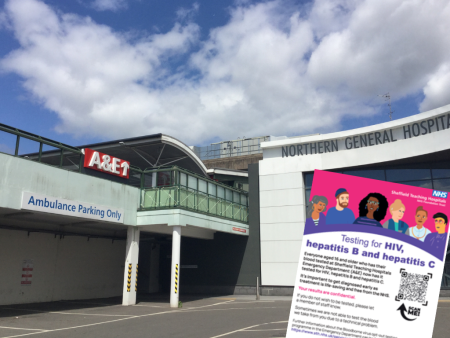
Opt-out blood borne virus testing, will be commencing at Sheffield's A&E Department from Tuesday 1 October 2024.
People aged 16 and over who receive routine blood tests when they attend Sheffield’s Northern General Hospital A&E department are to be tested for HIV, hepatitis B and hepatitis C, regardless of symptoms, as part of a new Government scheme, unless they choose to opt out.
Thousands of people in England are thought to be living with an undiagnosed blood borne virus – HIV, hepatitis B or hepatitis C – without being aware they have one of these viruses.
The routine testing will support earlier detection and diagnosis of the blood borne viruses, saving lives and giving people access to the latest and most effective treatments (which can be curative in the case of hepatitis C).
For hepatitis B and C, treatment can reduce the risk of developing serious illness or complications (such as liver cirrhosis and cancer).
For HIV, treatment suppresses the virus, allowing people to live a normal life as well as preventing infection from being passed on. (If HIV is undetectable; it is un-transmittable). The scheme will also enable NHS staff to re-initiate contact with patients who have become disengaged with services before, during, or after treatment, giving them the opportunity to re-engage with services and thus improve longer-term outcomes.
The scheme supports the UK Action Plan to end all new HIV cases by 2030 through earlier identification and detection.
More than 56,000 blood tests are carried out in Sheffield’s A&E department a year – or 4,670 a month.
Sheffield Teaching Hospitals NHS Foundation Trust is one of 46 new sites to receive funding from the National Institute for Health and Care Research (NIHR) and NHS England to implement the scheme over the next 12 months. Posters are available in A&E to inform patients about the testing. If they are not required to have a blood test during their visit, they will not be tested.
Dr Rachel Foster, Consultant in Infectious Diseases and Acute Medicine at Sheffield Teaching Hospitals, said:
“We are really excited to be rolling out this life-saving routine opt-out testing scheme for blood borne viruses in our emergency department. Elsewhere in the country the scheme has had a significant impact in diagnosing thousands of people who would otherwise not have been aware they had HIV, hepatitis B or C, so we, as a Trust, are proud to improve the lives of the people we serve and target viruses that affect our local community. We also hope the scheme will normalise testing for HIV and thus reduce associated stigma.”
Aiden Cahill, who contracted hepatitis C in the late 1990s but did not complete treatment until 2018, now volunteers for The Hepatitis C Trust in Hull. In his role, he helps to test people for hepatitis C and supports them through treatment.
He said: “As someone who had hepatitis C for nearly 20 years, I think that Emergency Department testing for blood borne viruses is a great idea. It will mean more people will be found - and treated - more quickly.
“The longer hepatitis C goes untreated, the more likely it is to do damage to your liver. That’s why this initiative to test people when they visit the Emergency Department is a great way to detect and cure the virus before it does any long-lasting harm.”
All patients will be able to opt out of the testing by speaking to a member of staff. If the test comes back positive, the person will be offered specialist support and a treatment plan put in place for them.
The rollout of the Opt-Out Blood-Borne Virus Testing initiative in Sheffield is being supported by a successful collaboration between the Trust’s emergency, laboratory medicine, virology, infectious diseases and research departments, as well as the Stonegrove Centre.
Although bloodborne viruses can cause serious illness, in the majority of cases there is nothing to worry about.
Background to the programme
The first phase of the opt testing for blood borne viruses (BBV) went live in emergency departments in April 2022.
This was the first new funding for HIV testing in nearly a decade and formed an important part of the HIV Action Plan, to end new cases of HIV by 2030. In partnership with the HCV Elimination program at NHS England, testing was expanded to include hepatitis B and C.
Sheffield Teaching Hospitals NHS Foundation Trust is part of the second phase of the rollout as part of new funding provided by the National Institute for Health and Care Research (NIHR) and NHS England.
From the start of phase 1 opt out in 2022 up to present:
- 6,000 new BBVs have been detected by the project
- 876 new HIV diagnoses
- 1419 new Hep C cases detected
- 3,642 new Hep B cases detected
Since the May 24 implementation of the new nationwide phase of testing:
606 new diagnoses of BBVs have been made and 115 patients with BBVs now re-engaged in care.